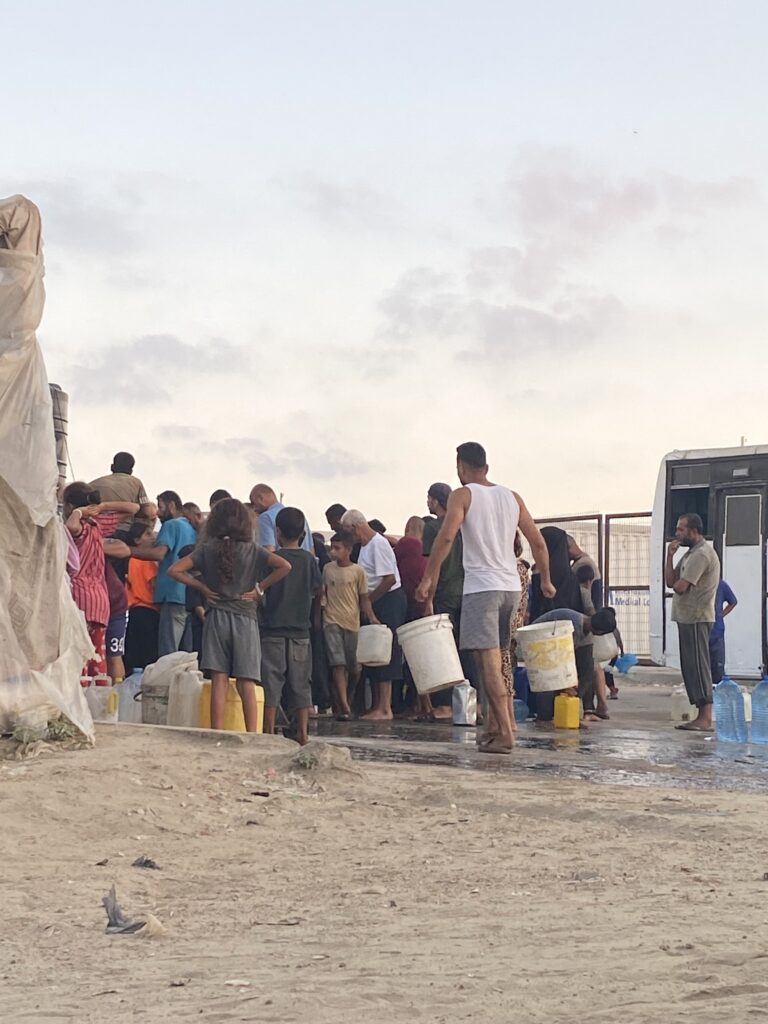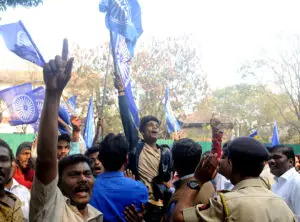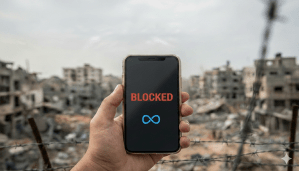
Letters from Palestine: The struggle and support to source water in Gaza

The genocide in Gaza is estimated to have killed over 47,000 Palestinians over the course of Israel’s fifteen-month-long war on Palestine, until the ceasefire agreement that came into effect in late January 2025. The agreement has finally seen borders opening to allow the entry of hundreds of trucks carrying aid, as well as the return of tens of thousands of displaced people into north Gaza. For the past fifteen months, Palestinians have struggled, endured, and survived. In this Letters from Palestine series, as part of our Watch The Resistance project, The Polis Project is publishing essays on what resistance has meant for Palestinians over the past year: its nature and forms, the challenges it presented, and how they overcame them. In doing so, the series highlights the lives of resilience and life as resistance in Palestine.
People forced to live in tents endure immense suffering. Stripped of our humanity and deprived of our basic necessities, we endure the suffering and somehow persevere with life as we know it. Despite the death and destruction surrounding us, we constantly strive for a dignified life, as we have no choice but to try and survive.
Every time we were forced to flee from one place to another to escape death, we always tried to secure the essentials of life that would help us endure, and the most important among them was water. Anyone can survive anywhere as long as water is available, but life is impossible without it. Every day that Israeli forces bombed Gaza, the suffering of the people increased, especially in their struggle to obtain water. The bombing deliberately targeted infrastructure and water wells to intensify the hardships of the population.
In the camp where I sleep, municipal water is available only one day a week. Those staying in the camp, which consists of 24 tents, line up to fill buckets with water, transporting them back and forth all day long. The tents are extremely close to one another—any empty piece of land measuring one square kilometre is considered a camp for displaced people. Some camps have access to water, because external organisations provide it to the nearest needed areas. Other camps, located far from municipal water lines, lack such access. These people face even greater challenges but continually strive to overcome them.
They help each other dig into the ground, seeking water at varying depths—sometimes five metres, sometimes nine. If they find water, they transport it back to their tents using buckets. Those managing the water stand in long lines, filling one or two buckets at a time, then returning to the queue to meet their needs.
Some families have large water tanks they fill to last for extended periods, reducing the need for daily water collection. However, when the municipality is unable to supply diesel to operate pumps and distribute water through street lines, residents are forced to seek the nearest available source. Some areas have wells with electric pumps that provide a continuous supply of water. People work together to ensure everyone has access when water is scarce. For instance, some of our neighbours do not have large tanks and face shortages just four days after the water arrives. So we share what we can, helping one another by giving some of our water.
My brother and I take turns to fill 1,000 litres every week, from early morning until sunset—a task requiring significant time and effort. We use this water for washing, cleaning our bodies, and doing the dishes. However, this water is very salty, and excessive use often causes skin diseases. Some people buy clean, purified water at high prices to avoid the skin ailments, rashes, and hair loss caused by the salty water.
People overcome all sorts of challenges to secure water and support one another because life is incredibly short. They believe that every act of kindness they do for others will be reflected in the life to come.
Nowadays, loud sounds come from the tents, women are ululating, and children are laughing and screaming with joy. It’s the time of ceasefire, and everyone is shouting. We can’t comprehend what’s happening. Will the war stop now? The answer is yes! We talk to each other in the street, not fully understanding what we are feeling.
My heart is beating so loudly, my breath is heavy, and I feel every movement of those around me. I hear all the sounds and look up at the sky, telling myself this is the end.
It took a year and a half to hear this news, and so many emotions have died within us, but now, together, we will try to bring them back as they were. They will return because we will return to our homes! Our home, yes, Shujaiya, Souq al-Jummah, and our house next to the farmland. I will return to my bed and my books, and my aunt too.
Aunt Nadia stayed there in northern Gaza and didn’t leave. She is waiting for us now with all her longing. I also believe that my clothes are waiting for me in my wardrobe. Why wouldn’t they wait for me? I used to treat my clothes like my best friends, putting them in the wardrobe so they could absorb my scent before I wore them again. But I wonder, are my books still waiting for me?
Professor Munir Fasheh from Jordan sent me five recently published books two years ago. These were the first set to enter Gaza, and no one else had them. I left them behind when I tried to escape with my life. We heard and saw the occupation destroying our homes and burning our libraries, and that makes me scared to return. Perhaps I won’t find any of it anymore.
Three days remain before we can return to the city, to our home, to the neighbourhood that has lost so many of its landmarks. But these days are heavy and very frightening because the occupation has not stopped bombing even now. They intentionally target everything before the official announcement because they are trying to steal our joy, our simple peace. People are still dying here, and everything is still terrifying.
It will all be over, and we will go back to our normal lives.
Related Posts
Letters from Palestine: The struggle and support to source water in Gaza

People forced to live in tents endure immense suffering. Stripped of our humanity and deprived of our basic necessities, we endure the suffering and somehow persevere with life as we know it. Despite the death and destruction surrounding us, we constantly strive for a dignified life, as we have no choice but to try and survive.
Every time we were forced to flee from one place to another to escape death, we always tried to secure the essentials of life that would help us endure, and the most important among them was water. Anyone can survive anywhere as long as water is available, but life is impossible without it. Every day that Israeli forces bombed Gaza, the suffering of the people increased, especially in their struggle to obtain water. The bombing deliberately targeted infrastructure and water wells to intensify the hardships of the population.
In the camp where I sleep, municipal water is available only one day a week. Those staying in the camp, which consists of 24 tents, line up to fill buckets with water, transporting them back and forth all day long. The tents are extremely close to one another—any empty piece of land measuring one square kilometre is considered a camp for displaced people. Some camps have access to water, because external organisations provide it to the nearest needed areas. Other camps, located far from municipal water lines, lack such access. These people face even greater challenges but continually strive to overcome them.
They help each other dig into the ground, seeking water at varying depths—sometimes five metres, sometimes nine. If they find water, they transport it back to their tents using buckets. Those managing the water stand in long lines, filling one or two buckets at a time, then returning to the queue to meet their needs.
Some families have large water tanks they fill to last for extended periods, reducing the need for daily water collection. However, when the municipality is unable to supply diesel to operate pumps and distribute water through street lines, residents are forced to seek the nearest available source. Some areas have wells with electric pumps that provide a continuous supply of water. People work together to ensure everyone has access when water is scarce. For instance, some of our neighbours do not have large tanks and face shortages just four days after the water arrives. So we share what we can, helping one another by giving some of our water.
My brother and I take turns to fill 1,000 litres every week, from early morning until sunset—a task requiring significant time and effort. We use this water for washing, cleaning our bodies, and doing the dishes. However, this water is very salty, and excessive use often causes skin diseases. Some people buy clean, purified water at high prices to avoid the skin ailments, rashes, and hair loss caused by the salty water.
People overcome all sorts of challenges to secure water and support one another because life is incredibly short. They believe that every act of kindness they do for others will be reflected in the life to come.
Nowadays, loud sounds come from the tents, women are ululating, and children are laughing and screaming with joy. It’s the time of ceasefire, and everyone is shouting. We can’t comprehend what’s happening. Will the war stop now? The answer is yes! We talk to each other in the street, not fully understanding what we are feeling.
My heart is beating so loudly, my breath is heavy, and I feel every movement of those around me. I hear all the sounds and look up at the sky, telling myself this is the end.
It took a year and a half to hear this news, and so many emotions have died within us, but now, together, we will try to bring them back as they were. They will return because we will return to our homes! Our home, yes, Shujaiya, Souq al-Jummah, and our house next to the farmland. I will return to my bed and my books, and my aunt too.
Aunt Nadia stayed there in northern Gaza and didn’t leave. She is waiting for us now with all her longing. I also believe that my clothes are waiting for me in my wardrobe. Why wouldn’t they wait for me? I used to treat my clothes like my best friends, putting them in the wardrobe so they could absorb my scent before I wore them again. But I wonder, are my books still waiting for me?
Professor Munir Fasheh from Jordan sent me five recently published books two years ago. These were the first set to enter Gaza, and no one else had them. I left them behind when I tried to escape with my life. We heard and saw the occupation destroying our homes and burning our libraries, and that makes me scared to return. Perhaps I won’t find any of it anymore.
Three days remain before we can return to the city, to our home, to the neighbourhood that has lost so many of its landmarks. But these days are heavy and very frightening because the occupation has not stopped bombing even now. They intentionally target everything before the official announcement because they are trying to steal our joy, our simple peace. People are still dying here, and everything is still terrifying.
It will all be over, and we will go back to our normal lives.
SUPPORT US
We like bringing the stories that don’t get told to you. For that, we need your support. However small, we would appreciate it.







